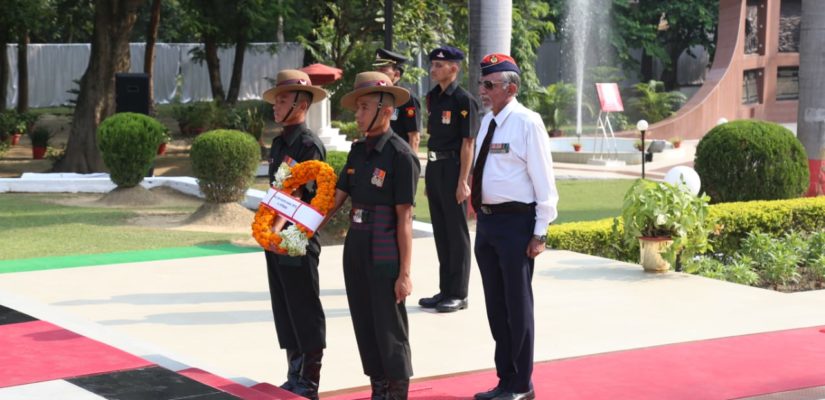
Pakistan, China and terrorism (English Version) Amar Ujala 25 Nov 2020

Pakistan, China and terrorism (English Version) Amar Ujala 25 Nov 2020
The recent encounter in Nagrota, where four Pak terrorists, who had infiltrated from Samba, through a tunnel, were eliminated is a display of growing desperation within the Pak establishment. The subsequent discovery of the tunnel and the decision of the Indian government to brief select envoys, including permanent members of the UN Security Council (less China) implies that India has irrefutable proof of Pak’s involvement and intent. The reasons for Pakistan’s desperation are multiple.
Firstly, Pakistan’s Kashmir strategy is failing. This year they have barely been able to infiltrate 20-25 terrorists, many of whom have been eliminated. Most infiltration attempts have been thwarted. Strong Indian retaliation has resulted in destruction of Pak posts and terrorist camps leading to casualties of both, terrorists and Pak soldiers, with little concern to collateral damage. Most terrorist groups in the valley are currently leaderless or led by those who have almost no experience of coordinating terrorist activities. The availability of arms and ammunition in the valley has dropped, compelling Pakistan to resort to the use of drones or smuggling to dispatch weapons. The fact that these four terrorists were transporting 11 AK’s indicates that there is a shortfall of weapons.
Secondly, their main proxy, the Hurriyat, has been completely isolated. By taking away their privileges, blocking Hawala inflow of funds, investigating into their properties acquired by illegal means, the government has exposed their linkages to Pakistan. With no availability of funds, organized protests, violence during encounters to enable escape of trapped terrorists, forced bandhs, orchestrated funerals of those killed in encounters have almost come to a standstill. This has led to relative peace in the valley, putting at rest Pak’s claims that the valley is militarily controlled.
Thirdly, Pakistan has failed to fulfil demands of China to continue keeping the valley in turmoil. While China hesitates to seek direct military intervention of Pak in its current standoff with India, it has demanded that Pak keep the LoC active and enhance terrorism in the valley to keep Indian forces distracted. Pakistan is unable to fulfil either of these two demands. Indian retaliation has been severe and punishing causing high casualties and impacting morale of its soldiers. Terrorism in the valley is waning with normalcy returning to most regions. There is no doubt that China would be criticizing Pak for its failures.
Simultaneously, Pakistan fears that in case there is a major terrorist strike, India would retaliate with force. With its nuclear myth busted, it would have limited choices. Any Indian counterstrike would add to pressures on the Pak army, which is already under domestic duress from the PDM (People’s Democratic Movement), a combination of major opposition parties, demanding it stop interference in political activities. Comments by Ayaz Sadiq, in the national assembly, projecting panic within the Pak military and political leadership post the Balakote strike, continues to haunt the Pak leadership. A failing Pak economy has left it with almost no oil and ammunition reserves to sustain any major operation beyond a few days.
The release of the Pak dossier was a desperate attempt to shift blame from itself to India, claiming India is resorting to similar practises. Details in the dossier being fake and full of errors is well established. The dossier has found no takers other than China. The Chinese foreign office spokesperson stated on the aspect of India targeting the CPEC, ‘China appreciates the positive contribution by Pakistan to the international counter-terrorism cause, firmly supports Pakistan in cracking down on terrorist forces. Attempts that aim to sabotage CPEC are doomed to fail.’
The announcement of District Development Council (DDC) elections commencing this week only proves that the Indian government is confident of controlling terrorism in the valley and reinvigorating the democratic process. The scenario which has been created has led to all political parties participating in this election, including from the state and centre. The PAGD (Political Alliance for Gupkar Declaration), a grouping of 11 valley based political parties, which was unwilling to join any political process, since the abrogation of Article 370, has announced its participation. These political parties had always demanded talks with Pakistan but would now fight on a different platform.
The smooth conduct of these elections would prove to the world that the valley is peaceful and democratic processes have been initiated. A large voter turnout would display that the common Kashmiri has rejected Pakistan and its claims and willingly accepted abrogation of Article 370. It would bust Pakistan’s theory of a militarily suppressed Kashmir. For Pakistan, this would be the end of its claims on Kashmir and all its lies would be exposed. With India addressing select envoys with concrete proof of Pak involvement, any further terrorist strike in the valley prior or during the election process would be pinned on Pakistan.
China is facing a strong Indian challenge in Ladakh. It has been compelled to spend winters in the region, a first for Chinese Han soldiers. Its plans of altering status quo and securing its claim lines has met with failure. The occupation of Kailash Ridge and determination of India to hold onto vantage heights through the winters has checkmated China. Its close ally, Pakistan, has also not been able to deliver in Kashmir, nor has it been able to tie down Indian soldiers along the LoC.
India currently has the upper hand however it is not time to gloat. The smooth conduct of elections is essential for changing the global view on Kashmir. Till they conclude security forces must remain on high alert and be unrelenting on Pak’s attempts to disturb the election process. The time to prove Pakistan’s lies on Kashmir has come, it must be exploited.